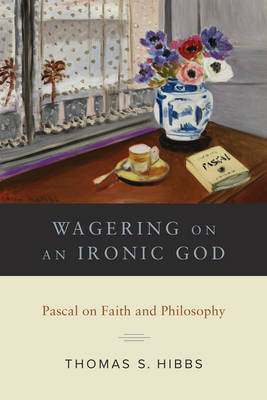
Stock image for illustration purposes only - book cover, edition or condition may vary.
Wagering on an Ironic God: Pascal on Faith andPhilosophy
Thomas Hibbs
€ 64.97
FREE Delivery in Ireland
Description for Wagering on an Ironic God: Pascal on Faith andPhilosophy
Hardback. Num Pages: 235 pages. BIC Classification: HRAB; HRCM. Category: (G) General (US: Trade). Dimension: 228 x 152. .
Philosophers startle ordinary people. Christians astonish the philosophers. aPascal, PensA (c)es In Wagering on an Ironic God Thomas S. Hibbs both startles and astonishes. He does so by offering a new interpretation of Pascal's PensA (c)es and by showing the importance of Pascal in and for a philosophy of religion. Hibbs resists the temptation to focus exclusively on Pascal's famous wager or to be beguiled by the fragmentary and presumably incomplete nature of PensA (c)es . Instead he discovers in PensA (c)es a coherent and comprehensive project, one in which Pascal contributed to the ancient debate over the best way of lifeaa life of true happiness and true virtue. Hibbs situates Pascal in relation to early modern French philosophers, particularlyMontaigne and Descartes. These three French thinkers offer distinctly modern accounts of the good life. Montaigne advocates the private life of authentic self-expression, while Descartes favors the public goods of progressive enlightenment science andits promise of the mastery of nature. Pascal, by contrast, renders an account of the Christian religion that engages modern subjectivity and science on its own terms and seeks to vindicate the wisdom of the Christian vision by showing that it, better than any of its rivals, truly understands human nature. Though all three philosophers share a preoccupation with Socrates, each finds in that figurea distinct account of philosophy and its aims. Pascal finds in Socrates a philosophy rich inirony: philosophyis marked by a deep yearning for wisdom that is never whollyachieved. Philosophy is a quest without attainment, a love never obtained. Absent Cartesian certaintyor the ambivalence of Montaigne, Pascal's practice of Socratic irony acknowledges the disorder of humanity without discouraging its quest. Instead,the quest for wisdomalerts the seekerto the presence of a hidden God. God, according to Pascal, both conceals and reveals, fulfilling the philosophical aspiration for happiness and the good life only by subverting philosophy's veryself-understanding. Pascal thus wagers all on the irony of a God whoboth startles and astonishes wisdom's true lovers.
Product Details
Publisher
Baylor University Press
Format
Hardback
Publication date
2017
Condition
New
Weight
28g
Number of Pages
216
Place of Publication
Waco, United States
ISBN
9781481306386
SKU
V9781481306386
Shipping Time
Usually ships in 15 to 20 working days
Ref
99-99
About Thomas Hibbs
Thomas Hibbs is Associate Professor of Philosophy, Boston College.
Reviews for Wagering on an Ironic God: Pascal on Faith andPhilosophy
Philosophers startle ordinary people. Christians astonish the philosophers.
Pascal, Pensees Towards the end of Wagering on an Ironic God , Thomas Hibbs asks his reader: 'How much more rewarding would our discussions (dare we say our lives?) be if they were informed by the writings of Montaigne, Descartes, and Pascal?'. Wagering reads like an invitation to such a discussion with Hibbs, and evidences many of the delights and peculiarities of such a conversation.
J. Columcille Dever
Modern Theology An original and probing interpretation of Pascal's wager, reconstructed along the line of Socratic ignorance.
John J. Conley, S.J
International Philosophical Quarterly ...Thomas Hibbs is intent on bringing Pascal and his distinctive thought to the fore. In doing so, he makes a signal contribution to our understanding of modern philosophy itself. He not only rehabilitates Pascal, but sheds important light on his philosophical interlocutors, Montaigne and Descartes. This book could be profitably read merely for its treatments of Montaigne and Descartes. But the triangle of Montaigne, Descartes, and Pascal is historically apposite and philosophically quite illuminating.
Paul Seaton
The Review of Politics Hibbsas book is appropriate for those interested in Pascalas thought, and the major philosophical influences that played a central role in the forming of Pascalas thought. It also serves as a corrective for the common tendency to focus only on the wager, while ignoring all else found in Pascalas PensA (c)es .
Jeff Jordan
The Review of Metaphysics
Pascal, Pensees Towards the end of Wagering on an Ironic God , Thomas Hibbs asks his reader: 'How much more rewarding would our discussions (dare we say our lives?) be if they were informed by the writings of Montaigne, Descartes, and Pascal?'. Wagering reads like an invitation to such a discussion with Hibbs, and evidences many of the delights and peculiarities of such a conversation.
J. Columcille Dever
Modern Theology An original and probing interpretation of Pascal's wager, reconstructed along the line of Socratic ignorance.
John J. Conley, S.J
International Philosophical Quarterly ...Thomas Hibbs is intent on bringing Pascal and his distinctive thought to the fore. In doing so, he makes a signal contribution to our understanding of modern philosophy itself. He not only rehabilitates Pascal, but sheds important light on his philosophical interlocutors, Montaigne and Descartes. This book could be profitably read merely for its treatments of Montaigne and Descartes. But the triangle of Montaigne, Descartes, and Pascal is historically apposite and philosophically quite illuminating.
Paul Seaton
The Review of Politics Hibbsas book is appropriate for those interested in Pascalas thought, and the major philosophical influences that played a central role in the forming of Pascalas thought. It also serves as a corrective for the common tendency to focus only on the wager, while ignoring all else found in Pascalas PensA (c)es .
Jeff Jordan
The Review of Metaphysics
